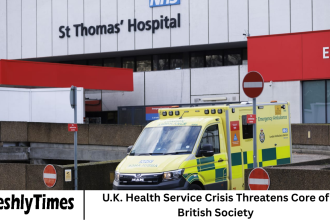A growing controversy has emerged in the United Kingdom over claims that trans activists have influenced an NHS-backed study on gender-questioning children. Critics say activists have “hijacked” research meant to guide medical treatment and policy for young people exploring their gender identity.
Supporters argue that activists are simply ensuring that transgender voices are heard in healthcare decisions. The debate highlights a deep divide over how gender services for children should be run, who should shape the research, and how much influence advocacy groups should have.
Background: The Cass Review
In 2020, NHS England asked Dr. Hilary Cass, a respected pediatrician, to review how gender identity services for children were operating. This became known as the Cass Review.
Her report, released in 2024, found that:
- There was weak evidence supporting puberty blockers and hormone treatments in children.
- Many young people seeking gender care had complex mental health or developmental issues.
- The NHS needed a more cautious, holistic approach, not one that rushed medical interventions.
The Cass Review called for more research to understand the long-term effects of treatment and to rebuild trust in gender services.
The New NHS Study
Following Cass’s findings, the NHS partnered with the James Lind Alliance (JLA) to identify research priorities on gender care for children and young people. The JLA is known for involving patients, parents, doctors, and other groups to decide what research questions matter most.
This study aims to explore:
- How best to support children questioning their gender.
- The safety and long-term outcomes of puberty blockers and hormone treatments.
- How mental health care can be integrated into gender services.
But this process has now become controversial.
The Accusations
Critics claim that trans activists have gained too much influence over the JLA project and other NHS efforts related to gender care. They argue that activist groups are pushing the research toward pro-transition outcomes and away from neutral scientific inquiry.
Here are the key allegations:
- Biased Framing – Some say the study uses activist-friendly language such as “gender diversity” instead of “gender dysphoria,” which could skew results.
- Survey Concerns – The project reportedly allows children as young as five to participate in surveys about gender identity, raising questions about consent and reliability.
- Activist Involvement – Advocacy groups that have publicly criticized the Cass Review are reportedly helping guide the study’s design and outreach.
- Pressure on Researchers – There are claims that NHS officials and researchers face pressure to align with activist views or avoid criticism from advocacy groups.
- Parental Concerns – Parents worry that their role in decision-making is being minimized while activist organizations are given too much authority.
What Critics Say
Critics include parents, medical professionals, and campaigners who believe NHS policy is being shaped by ideology instead of science. They warn that activist involvement could:
- Distort research outcomes and hide risks associated with puberty blockers.
- Reduce scientific independence by allowing advocacy groups to influence what questions are asked.
- Undermine trust between parents, doctors, and the NHS.
Some claim the NHS is “repeating past mistakes” by not learning from the controversy that led to the closure of the Tavistock gender clinic.
What Activists Say
Trans rights organizations strongly reject the accusations. They argue that:
- Their participation ensures trans people are heard in research that directly affects them.
- Excluding trans voices would repeat past discrimination and lead to unsafe policies.
- The NHS has a history of ignoring trans experiences, and their involvement balances the conversation.
- The term “hijacking” is used unfairly to silence trans communities and discredit their input.
Many activists believe the Cass Review was too critical of gender-affirming treatments and ignored the distress faced by transgender youth.
NHS Response
The NHS and James Lind Alliance have said that involving all stakeholders—including patients, parents, and advocacy groups—is standard in health research. They insist that the process remains independent and transparent, and that no single group controls the study.
Officials have also promised that all findings will be peer-reviewed and that parental consent procedures meet ethical standards. However, the NHS has faced growing political and media pressure to ensure the study is free from ideological bias.
The Larger Debate
This controversy sits at the heart of a bigger national conversation about gender, children, and medicine in the UK.
- Some argue that affirmative care (supporting a child’s declared gender identity) is essential for mental health and well-being.
- Others warn that too many young people may be rushed into medical treatment without fully understanding long-term effects.
The Cass Review tried to find a middle ground, calling for careful, evidence-based care. But the debate over activist influence has reopened old divisions.
Concerns About Research Integrity
When advocacy groups become heavily involved in scientific studies, questions can arise about research neutrality. Critics fear that activist-led projects may prioritize political goals over data accuracy.
Some experts stress that it is possible to include activists while maintaining scientific rigor — but only with clear rules:
- Full transparency about who is involved.
- Public disclosure of funding and affiliations.
- Independent oversight of survey design and data analysis.
Without these safeguards, the public could lose confidence in the study’s credibility.
Impact on Families and Clinicians
Parents say they want clear, trustworthy guidance from the NHS. Many are confused about the safety of puberty blockers, the role of therapy, and how to support children who are questioning their gender.
Clinicians, meanwhile, report being caught in the middle. They face:
- Political pressure from both activists and government officials.
- Ethical dilemmas over when to begin or delay medical treatment.
- Unclear or changing NHS policies as debates continue.
Both parents and doctors agree that trust in evidence-based care is vital — and that public disputes only make things harder for children seeking help.
Activism and Medicine: Finding Balance
Modern healthcare often involves advocacy groups. In areas like HIV, disability, and mental health, activists have improved patient rights and access to treatment.
But in gender medicine, the line between advocacy and influence is blurred. Supporters say activism ensures representation. Critics argue it can undermine neutrality.
To maintain public confidence, experts recommend:
- Transparent selection of advisory members.
- Equal input from parents, clinicians, and researchers.
- Independent data analysis before results are publicized.
- Clear language that distinguishes identity from medical diagnosis.
Political Reactions
UK politicians have also weighed in.
- Some members of Parliament have called for an investigation into how the NHS manages gender research.
- Others defend the inclusion of activists as part of a democratic, inclusive process.
The government says it supports evidence-based policymaking and expects the NHS to follow the Cass Review’s cautious recommendations.
What Happens Next
The JLA study is still ongoing. Its results will likely guide future NHS policies on how gender services for young people are structured.
The key questions are:
- Will the NHS ensure transparency about activist involvement?
- Can the study’s results be trusted as scientifically neutral?
- How will the findings shape medical treatments, access to hormones, and mental health support?
The outcome will likely influence how Britain approaches gender identity care for a generation.
Frequently Asked Question
What is the Cass Review?
It’s an independent NHS-commissioned report led by Dr. Hilary Cass that reviewed how gender identity services for children are run. It called for safer, evidence-based care and better research.
What is the James Lind Alliance (JLA) study?
A project funded by the NHS to identify research priorities on gender care for young people. It includes input from parents, clinicians, and advocacy groups.
Why are activists being accused of “hijacking” the study?
Critics say activist groups have influenced how surveys are written, who participates, and what questions are prioritized—possibly steering the research toward pro-transition outcomes.
What do trans activists say in response?
They reject the accusation, arguing that their involvement ensures trans voices are heard and that the study reflects real experiences rather than excluding affected communities.
Is there proof that activists changed the study results?
So far, there’s no solid evidence that activists have changed results—only claims about influence in design and language. The NHS maintains that the process is independent.
Why does this issue matter?
It affects how medical care, therapy, and parental guidance are shaped for gender-questioning children. Trust in NHS research and policy depends on transparency and neutrality.
What happens next?
The NHS will continue reviewing and revising its gender services. Future policies will depend on ongoing studies, public input, and government oversight.
Conclusion
The claim that trans activists have influenced an NHS study on gender-questioning children highlights the growing tension between activism and science. While involving the trans community is essential for fair and compassionate care, research must remain independent, transparent, and evidence-based.
The NHS now faces the difficult task of balancing inclusion with integrity—ensuring that politics does not overshadow patient safety or scientific truth. For families and young people, what matters most is not ideology but trustworthy, careful, and compassionate care.














